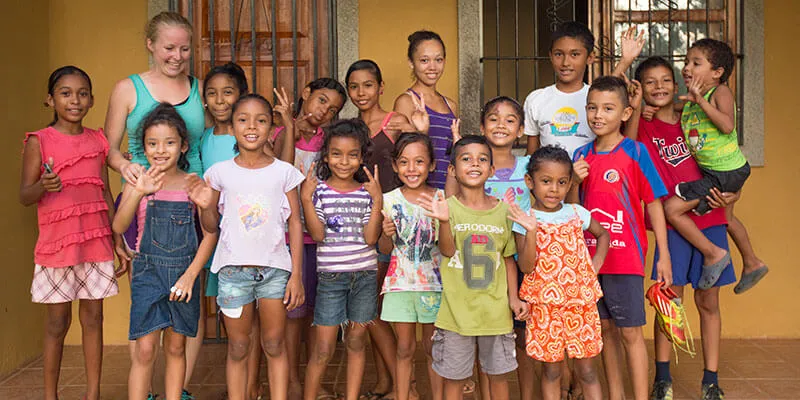There’s a beautiful photo of Tammy Stone ’11 with a gaggle of smiling children holding up two-finger victory signs against the backdrop of a colorful Costa Rica sunset.
In another snapshot, community members from the Costa Rican fishing village of Venado – population 300 -- stand proudly in front of a new community center. Yet another features a group of young men showing off their handcrafted surfboards.
For most people, such photos might serve as fond reminders of a long-past vacation. But for Stone, the images tell the tangible story of how her new Clara Vista foundation is applying the philosophy of Engineers Without Borders (EWB) to rural Venado.
While Stone’s work in Venado began last year, her ties to Engineers Without Borders go back to her freshman year at UVM’s College of Engineering and Mathematical Sciences, when she joined the university chapter of the group. Started in 2002 by University of Colorado professor of civil engineering Bernard Amadei, Engineers Without Borders partners with local communities in developing countries, bringing engineering-based solutions to problems such as road projects in El Salvador and dam restoration in Kenya.
Taking a current project underway through the UVM-Burlington chapter of Engineering Without Boarders. A group of undergraduate students are working with CEMS Dean Luis Garcia, as well as additional mentors from within and outside the college, to create a grey water treatment system for the Nicaraguan village of Venecia.
The idea is to design a treatment system that will allow residents to reuse waste water from kitchens, laundries or sinks in their gardens, says Ben Cares ‘16, president of the UVM-Burlington EWB chapter. Currently, the village suffers from food shortages during the dry season due to a lack of water.
While designing the treatment system is one part of the Venecia project, the chapter is finding it needs to address some questions that wouldn’t arise within a U.S. project, such as investigating what types of materials will be available to them in Nicaragua, Cares notes.
Engineers Without Borders draws students “who want to help others through engineering,” he adds.
For Venado’s residents, the surfboards represent an economic opportunity, Stone notes. Her goal through the Surf Mentor program is to help 12 young underprivileged residents learn the skills to create their own boards. That, in turn, will provide them with the know-how for a new business.
“We intend on supporting the creation of a small surfboard repair business where they will be able to use their newly acquired skills, like basic shaping, glassing, and sanding techniques, for financial support,” Stone says. “The program is unique, and it’s a great example of coming up with a program that is contextualized to the local culture.”
Through Clara Vista, the Surf Mentor program provides the raw materials and training to build the twelve surfboards, which will be available for community members to use.
The program is funded through donations of $160, which provides one youth with the materials to build one surfboard. As the Clara Vista Foundation notes, the surfboards supports the youth’s “respect for the ocean and our planet. They have kept their beach clean, maintained the recycling program and donated many hours to the Venado Community Center.”
Stone and fellow CEMS ’11 graduates Jessica Buckley and Justin Jannone, who co-founded Clara Vista with her, aren’t only focusing on surfboards. Their program has brought a recycling program to the town, helped build the community center, and offered English classes and entrepreneurship opportunities to its citizens.
Stone started planning the Costa Rican project that would eventually culminate in her founding Clara Vista when she took a class at UVM with Dan Baker, an associate professor at the university’s Community Development and Applied Economics (CDAE) department. The course introduced the class to some of his fieldwork in Honduras.
“Dr. Baker’s courses opened my eyes to international fieldwork. For me, that is where it all started,” Stone says. “I started developing our first program in Costa Rica, in recycling and waste management, while participating in his class.”
Stone continued her work with EWB throughout her time in Vermont, then moved to Boulder for graduate school to work more closely with Amadei, who had by then founded the Mortenson Center for Engineering in Developing Communities at the University of Colorado at Boulder.
“Passionate about international development, I decided to pursue my Masters degree to take courses in sustainable community development. Bernard was my professor, mentor and advisor,” Stone says. “The new center recognizes that there is a great need to learn about engineering in developing communities before implementing projects.”
Stone notes that she hasn’t lost touch with colleagues from UVM.
“Surprisingly, my whole board is UVM alumni from Dr. Baker’s Honduras class. This wasn’t intentional. At first it was only Jessica Buckley and Justin Jannone -- we were on the same Capstone senior design team,” Stone says. Since then, two other UVM graduates – Nicole Mason ’07 and Lesley Bristol ’11 – have joined Clara Vista.
Stone now makes trips down to Costa Rica to lead all of the fieldwork while the board helps her maintain Clara Vista. Jannone helps with the website, Mason is the secretary, Buckley helps with project management, and Bristol works on fundraising. But there’s still a lot of work to be done.
“Now that the community center is up and running, we are considering taking on interns to help manage the community center in the field and build local capacity,” Stone says.
If you are interested in supporting The Surf Mentor program, please email claravistafoundation@gmail.com for more information. Visit the Clara Vista website for more information. For more information about the UVM-Burlington chapter of Engineers Without Borders visit their website.
